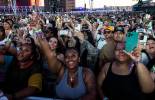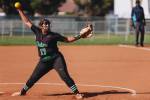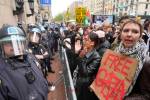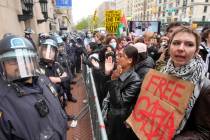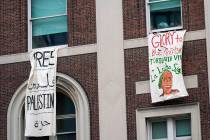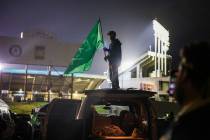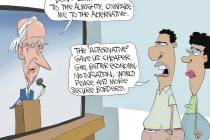LETTERS: NSHE officials get one set of standards, students and faculty another
To the editor:
Foul deeds in high places sometimes reveal double standards. For university students and faculty, standards for academic honesty, ethics and integrity are clear. Students who plagiarize receive failing grades and can be expelled. Faculty who plagiarize lose their jobs, like the UNLV professor who was fired late last year.
But what standards apply when the plagiarists are important and powerful people? A series of recent articles and opinion columns in the Review-Journal (“Nevada higher education agency copies think-tank report for grant,” Dec. 14; “Brookings: Plagiarism dispute with Nevada agency ‘behind us,’” Dec. 24; “Regents: Plagiarism questions shouldn’t get in the way of policy,” Dec. 25; and the Dec. 28 editorial “NSHE plagiarism issue highlights double standard”) reveal that two of the highest-ranking, nonelected officials with the Nevada System of Higher Education, Chancellor Dan Klaich and Frank Woodbeck, plagiarized a report by Brookings Mountain West and then presented the purloined passages in public to a legislative committee.
Only when their foul deed was detected did the NSHE officials acknowledge that large sections of their presentation were lifted from the Brookings report without quotation marks and without identifying the source. So what standards apply to these important and powerful people? Apparently none. Brookings backed off and the NSHE Board of Regents caved in, both saying that the subject of their presentation, a grant proposal for teaching science, math and engineering at Nevada universities, was so important that their transgression must be overlooked.
Good luck to university faculty who must now explain to students why standards for academic honesty, ethics and integrity apply to them but not to NSHE officials. Good luck to students who must now try to make sense of that.
THOMAS R. BURKHOLDER
HENDERSON
No indictments
To the editor:
Many people claim they don’t understand what’s going on in America with the demonstrations calling out police brutality against black people. The New York assassination of two police officers by a black man has thrown fuel on the fire.
As a white person, I admit to being puzzled about the violent and nonviolent protests. Considering the huge body of evidence considered by the grand jury in Missouri and the facts known to us, it seems obvious that the Ferguson policeman could not be indicted for any crime.
But rioting erupted anyway. The protesters wanted the officer indicted and found guilty of murder, but a jury of his peers would never have convicted anyone based on the evidence at hand. The national press has not promoted serenity, but has stirred the pot by emphasizing the testimony of the “hands up” story and even suggested that Michael Brown was running away when shot. The blood trail at the scene confirmed that Mr. Brown was leaving the scene but then came back toward the policeman. He was a huge young man who had assaulted an officer in his car.
The U.S. Justice Department has also stirred racial hatred by indicating it would pursue a civil rights violation in this case. Again, it is hard to see how a jury would convict in a civil trial.
Much has been made of the imbalance in black-white police staffing in Ferguson. That imbalance was surprising, but one wonders if the high crime rate and poor schooling in the black community there has disqualified many would-be police applicants?
The Eric Gardner tragedy in New York should never have happened. It was a penny-ante crime for which Mr. Garner had been arrested nine times in the past; police would be better employed going after real criminals. But in fairness to those cops involved, they were doing their job, and when Mr. Garner was first asked to move on, he did not. He then resisted arrest. The police involved in this needless tragedy have been castigated, and the protesters want a murder indictment. But if an indictment was handed down, would a jury convict? I don’t think so.
It looks to me that in both of these tragedies justice has worked properly, so why are so many protesting? It seems that Al Sharpton and our mainstream media need to back off and dampen the racial rhetoric. The police have been demonized and now targeted. Time to cool it.
RICHARD N. FULTON
HENDERSON
Ferguson injustice
To the editor:
John M. McGrail’s Dec. 20 letter to the editor gives us a pretty good understanding of what a “show trial” is. He correctly points out that any prosecutor who indicted a policeman when he knew that there was not sufficient reason for such an indictment simply would be looking for a show trial.
That being said, what do you call a prosecutor who places indictment in the hands of a grand jury that he controls, giving that jury case law he knows was found unconstitutional by the Supreme Court? Further, that prosecutor acknowledged publicly that he presented so-called eyewitness testimony to that same jury which he knew beforehand was not true. Do we have a name for such a prosecutor? The law does. It calls such action the illegal suborning of false testimony.
Both of these actions were taken by St. Louis County prosecutor Robert McCulloch with the grand jury that looked into the Ferguson policeman. In this incident, Mr. McCulloch publicly announced the grand jury’s finding of no reason to indict, with these words: “There was a lot of conflicting testimony by the eyewitnesses to the shooting.” Really? Given that he knew that some of the testimony was in fact false, should that have surprised him?
The grand jury proceeding was a sham, and the prosecutor should lose his license to practice law and be sent to jail.
RICHARD L. STRICKLAND
NORTH LAS VEGAS



